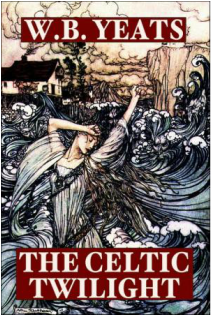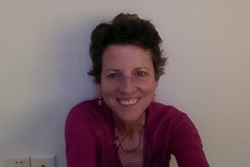
We are ending 2015, the year of Yeats. Irish nationalist poet Yates believed in fairies and he spent many hours interviewing Irish peasants who also did. In Celtic Twilight, Yates asks, "Have you ever seen a fairy or such like?" The reply: "Amn't I annoyed with them." Yates thus embarks on his mission to capture the remnants of "Irish fairy folk-faith." The Irish word for fairy is sheehogue [sidheóg], a diminutive of "shee" in banshee. Fairies are deenee shee [daoine sidhe] (fairy people). Do they die? Blake saw a fairy's funeral; but in Ireland we say they are immortal.
So, Yates is among the believers. In an odd choice of allies, he offers an interchange between Socrates and Phaedrus as they amble beside a stream. Phaedrus wants to know if there really is a place where "Boreas is said to have carried off Orithyia from the banks of the Ilissus." Socrates is coy, "that's the tradition." But when Phaedrus asks for the "exact spot," you can imagine Socrates waves casually to a place "about a quarter-of-a-mile lower down, where you cross to the temple of Artemis, and I think that there is some sort of an altar of Boreas at the place." So, is this encounter real, Phaedrus asks, " I beseech you to tell me, Socrates, do you believe this tale?
And Socrates' answer, does it disappoint Phaedrus -- and Yates? The wise doubt, he first says, and I could find a rational explanation for Orithyia's death. He returns to the problem of place - the place where she is said to have been carried off by Boreas. It could be this one or another, since there are other speculations. But he dismisses the story, since the "inventor" of the tale, once begun, "must go on and rehabilitate centaurs and chimeras dire. Gorgons and winged steeds flow in apace and numberless other inconceivable and portentous monsters." Socrates doesn't care where. "Shall I tell you why? I must first know myself, as the Delphian inscription says; to be curious about that which is not my business, while I am still in ignorance of my own self, would be ridiculous."
Yates does consider it his business, and he does care: not only where, but who, and when, and what they say. In Celtic Twilight he collects short stories among "inventors", the story-tellers of fairy encounters, and in it he intersperses his own encounters. In one collection, Fairy and Folk Tales of the Irish Peasantry, Edited and Selected by W. B. Yeats, 1888 he offers various stories, an in Celtic Twilight, an encounter of his own:
So, Yates is among the believers. In an odd choice of allies, he offers an interchange between Socrates and Phaedrus as they amble beside a stream. Phaedrus wants to know if there really is a place where "Boreas is said to have carried off Orithyia from the banks of the Ilissus." Socrates is coy, "that's the tradition." But when Phaedrus asks for the "exact spot," you can imagine Socrates waves casually to a place "about a quarter-of-a-mile lower down, where you cross to the temple of Artemis, and I think that there is some sort of an altar of Boreas at the place." So, is this encounter real, Phaedrus asks, " I beseech you to tell me, Socrates, do you believe this tale?
And Socrates' answer, does it disappoint Phaedrus -- and Yates? The wise doubt, he first says, and I could find a rational explanation for Orithyia's death. He returns to the problem of place - the place where she is said to have been carried off by Boreas. It could be this one or another, since there are other speculations. But he dismisses the story, since the "inventor" of the tale, once begun, "must go on and rehabilitate centaurs and chimeras dire. Gorgons and winged steeds flow in apace and numberless other inconceivable and portentous monsters." Socrates doesn't care where. "Shall I tell you why? I must first know myself, as the Delphian inscription says; to be curious about that which is not my business, while I am still in ignorance of my own self, would be ridiculous."
Yates does consider it his business, and he does care: not only where, but who, and when, and what they say. In Celtic Twilight he collects short stories among "inventors", the story-tellers of fairy encounters, and in it he intersperses his own encounters. In one collection, Fairy and Folk Tales of the Irish Peasantry, Edited and Selected by W. B. Yeats, 1888 he offers various stories, an in Celtic Twilight, an encounter of his own:
One day I was walking over a bit of marshy ground close to Inchy Wood when I felt, all of a sudden, and only for a second, an emotion which I said to myself was the root of Christian mysticism. There had swept over me a sense of weakness, of dependence on a great personal Being somewhere far off yet near at hand. No thought of mine had prepared me for this emotion, for I had been pre-occupied with Ængus and Edain, and with Mannanan, son of the sea. That night I awoke lying upon my back and hearing a voice speaking above me and saying, 'No human soul is like any other human soul, and therefore the love of God for any human soul is infinite, for no other soul can satisfy the same need in God.' A few nights after this I awoke to see the loveliest people I have ever seen. A young man and a young girl dressed in olive-green raiment, cut like old Greek raiment, were standing at my bedside. I looked at the girl and noticed that her dress was gathered about her neck into a kind of chain, or perhaps into some kind of stiff embroidery which represented ivy-leaves. But what filled me with wonder was the miraculous mildness of her face. There are no such faces now. It was beautiful, as few faces are beautiful, but it had neither, one would think, the light that is in desire or in hope or in fear or in speculation. It was peaceful like the faces of animals, or like mountain pools at evening, so peaceful that it was a little sad. I thought for a moment that she might be the beloved of Ængus, but how could that hunted, alluring, happy, immortal wretch have a face like this? Doubtless she was from among the children of the Moon, but who among them I shall never know. (The Celtic Twilight, by William Butler Yeats, [1893, 1902], 115)
NOTE: So here's an article on Yates and new animism. Sinéad Garrigan Mattar, “Yeats, Fairies, and the new Animism,” New Literary History, Volume 43, Number 1, Winter 2012, pp. 137-157
Where do we go now for our own investigations? There is so much Ontological Spin among American anthropologists these days. In search of new forms of being. Certainly the claim of multiple ontologies is a cosmopolitic as others a lot smarter than I have claimed. But I keep turning to this question: Is there retrieval, re-entry into plural worlds? Is there a way to re-spacialize and re-populate post-post modern life with non-ordinary worlds and overlapping ontologies intersecting with our own and laying various claims on us? Is there a way past the tired dismissals of superstitious, esoteric, primitive? Despite Latour as Robin Hood and his lusty ontological bandits, I can't feel the lived world of it. It remains a philosophical jibe.
Where do we go now for our own investigations? There is so much Ontological Spin among American anthropologists these days. In search of new forms of being. Certainly the claim of multiple ontologies is a cosmopolitic as others a lot smarter than I have claimed. But I keep turning to this question: Is there retrieval, re-entry into plural worlds? Is there a way to re-spacialize and re-populate post-post modern life with non-ordinary worlds and overlapping ontologies intersecting with our own and laying various claims on us? Is there a way past the tired dismissals of superstitious, esoteric, primitive? Despite Latour as Robin Hood and his lusty ontological bandits, I can't feel the lived world of it. It remains a philosophical jibe.

 RSS Feed
RSS Feed
